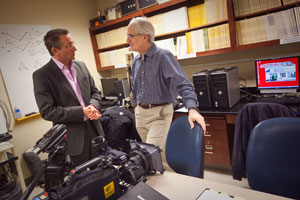 The BBC plans to feature Robert W. Allan, associate professor of psychology, in a major new series about science.
The BBC plans to feature Robert W. Allan, associate professor of psychology, in a major new series about science.
BBC-TV host Michael Mosley and a video crew visited Lafayette Dec. 16 to interview Allan, a well-respected researcher in the branch of psychology known as behaviorism, which studies the relationships among behavior and environment in animals and humans.
BBC’s new series, Science Story, will feature six one-hour programs that will be broadcast in the United Kingdom in 2010 to tie in with the 350th anniversary of the Royal Society in London. The series will then be distributed by BBC Worldwide.
Allan teaches courses on quantitative methods, learning, and applied behavior analysis, and an interdisciplinary course on addiction in the VAST (Values and Science/Technology) series. A member of the Lafayette faculty since 1991, he has supervised more than 150 Lafayette students in honors theses, EXCEL research, independent studies, and advanced research.
“Science Story is examining six broad questions,” says Mosley. “The first one is ‘What’s out there?’ which is a look at the cosmos. The second [topic] is ‘What are we made of?’ which investigates chemistry [and biochemistry]. Next is ‘Where did we come from?’ which examines evolution and technology. The fourth question is ‘What is power?’ which looks at physics, thermodynamics, up to E=mc2. The fifth show focuses on ‘What makes us tick?’ which examines human physiology. This segment [with Prof. Allan] is ‘What makes us human?’ which looks at the human mind.”
Adds Sarah Forster, production coordinator for Science Story, “The final program [in the series] looks at how we have understood the brain and the mind throughout history. One of the key figures in the program is B.F. Skinner. Robert Allan is a behaviorist in the tradition of Skinner, and he agreed to let us interview him and to do a demonstration of behaviorism so that our audience can understand the techniques and theories of this psychological theory.”
Allan uses pigeons for his research into behavior .He uses chambers outfitted with response keys that the pigeons can peck to obtain a food reinforcer. He and his students examine such topics as factors that influence choices, which have implications for many fields including economic theory, and the post-reinforcement pause, in which pigeons (and humans) take a break after finishing a task or receiving a reinforcer.
 The BBC plans to feature Robert W. Allan, associate professor of psychology, in a major new series about science.
The BBC plans to feature Robert W. Allan, associate professor of psychology, in a major new series about science.